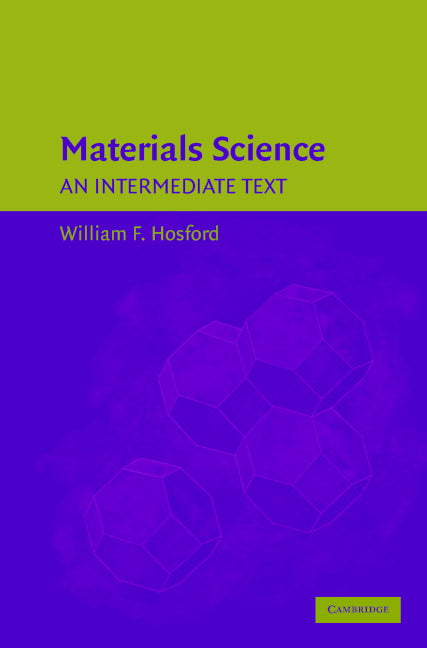Freshly Printed - allow 8 days lead
Couldn't load pickup availability
Materials Science
An Intermediate Text
An exciting textbook, suitable for intermediate to advanced courses in materials science.
William F. Hosford (Author)
9780521867054, Cambridge University Press
Hardback, published 4 December 2006
252 pages
26.1 x 18.2 x 2 cm, 0.713 kg
Review of the hardback: 'This book takes a new approach, breaking the subject down into short sections each containing simple, logical explanations, lots of diagrams and numerous example systems … each provides a systematic and concise explanation of the chapter topic, and there are 20 packed into this book … Overall I found this text very enjoyable and useful by making it fast to locate key information and get an insight into a particular topic in materials science. The book is written and produced in a highly accessible style, though the topic distribution might limit its use except as a supplementary text.' Chemistry World
This exciting textbook on the structure, property and applications of materials, is written for advanced undergraduate courses on the principles of Materials Science. It covers the main topics commonly encountered by students in materials science and engineering but explores them in greater depth than standard introductory textbooks, making it ideal for use on a second-level course and upwards. Major topics covered include crystallography, symmetry and bonding-related properties, phase diagrams and transformations, ordering, diffusion, solidification, and dedicated chapters on amorphous, liquid crystal, magnetic and novel materials, including shape memory. Each chapter contains numerous illustrative examples, problem sets, references and notes of interest to aid student understanding, with a chapter of hints on engineering calculations to ensure mathematical competency.
1. Microstructural analysis
2. Symmetry
3. Miller-Bravais system
4. Stereographic projection
5. Crystal defects
6. Phase diagrams
7. Free energy basis for phase diagrams
8. Ordering of solid solutions
9. Diffusion
10. Freezing
11. Phase transformations
12. Surfaces
13. Bonding
14. Sintering
15. Amorphous materials
16. Liquid crystals
17. Molecular morphology
18. Magnetic materials
19. Porous and novel materials
20. Shape memory and super-elasticity
21. Calculations.
Subject Areas: Educational: Technology [YQT], Materials science [TGM], Fluid mechanics [PHDF]


